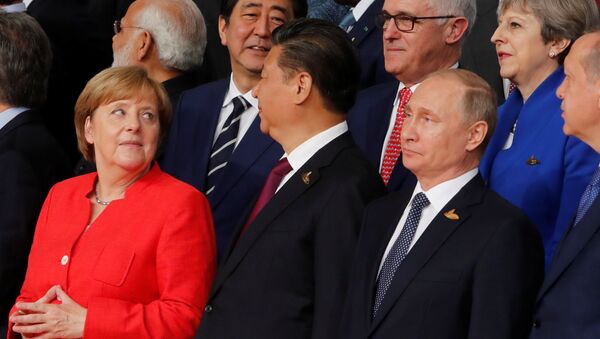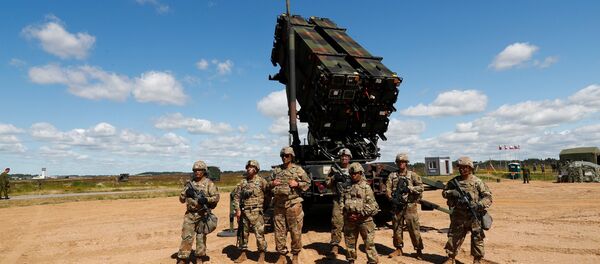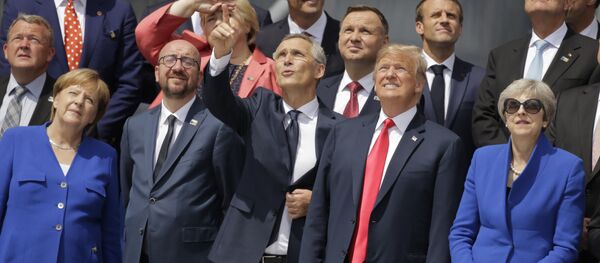One poll, conducted last November and December by Atlantik-Brücke, or Atlantic Bridge, surveyed 5,000 Germans about which country is a better partner to theirs. Only 23.1 percent said they saw the US as a better partner than China, while 42 percent said the reverse.
42% of Germans think China "more reliable partner" than US.
— Thorsten Benner (@thorstenbenner) February 9, 2019
Only 23% think US is more reliable.
35% undecided.
Striking Atlantik-Brücke poll figures. Demonstrate #GermanChinaRethink so far elite project without public support while Trump caused broad public damage to US image pic.twitter.com/OX7e45L8jV
Overall, 85 percent of German respondents characterized the US-German relationship as negative.
"Given the huge loss of confidence in the US, we need to engage more than ever in our talks with and about America," Burkhard Schwenker, deputy chairman of Atlantic Bridge, said of the results. Atlantic Bridge is a pro-NATO, nonprofit group that promotes US-Europe relations, the UK Independent noted.
In the report, Michael Werz, a senior fellow at the US-based Center for American Progress think tank, chided the Germans for their ambivalence, saying, "The Germans must leave the comfort of neutrality behind and, despite all legitimate criticism of the current US administration, not let anti-American resentment obscure the dangers posed by the authoritarian systems in Russia and China."
The other poll was conducted by the US-based Pew Research Center in partnership with the Munich Security Conference, and asked people from seven countries about which political leaders they trusted "to do the right thing regarding world affairs." The results showed that 35 percent of Germans trusted Putin and 30 percent trusted Xi to behave morally, whereas only 10 percent trusted Trump to do so. The other six nations surveyed were France, the US, Russia, Canada, the UK and Japan.
#Trump, #Putin, #XiJinping, #Merkel, #Macron… Who do citizens around the world trust to do the right thing in world affairs? – Survey data by @pewresearch in our brand-new #MSCreport #MSC2019: https://t.co/GXKlXCtMdG pic.twitter.com/fgYZWWCPxZ
— Security Conference (@MunSecConf) February 11, 2019
The MSC was quick to point the finger for this distrust at the collapse of the Intermediate-range Nuclear Forces Treaty, itself a consequence of what MSC Chair Wolfgang Ischinger called in the report "a new era of great power competition" that is unfolding "between the United States, China and Russia, accompanied by a certain leadership vacuum in what has become known as the liberal international order."
When US Vice President Mike Pence spoke at the Munich conference earlier this month, he boasted that thanks to "the leadership of President Donald Trump," the United States was "stronger than ever before, and… leading on the world stage once again." However, the German daily paper Der Spiegel lambasted his remarks, saying he described a "strange parallel world" which "has little to do with reality."
"America is not leading; it is retreating. Other powers are moving into the vacuum left by Trump's erratic 'America First' policy — China, Russia, but also Iran. And the US is not leading, but giving instructions," the paper wrote.
"It's not a matter of personality or geopolitics," journalist and author Daniel Lazare told Sputnik Tuesday, noting that the two are closely related.
"Trump's resurgent nationalism is a response to the post-2008 economic slowdown plus America's colossal foreign policy failures in the wake of the Arab Spring. For a while during the 2016 [election], he seemed to be in favor of a more rational reset of foreign relations, but under pressure from the Democrats and the neocons, he's opted for a foreign policy that is more aggressive than ever. This is the case with regard to Russia, China and particularly Iran," he said.
"None of this is in Europe's interests, so it's no surprise that the EU is developing a special trade vehicle to get around US sanctions against Iran, or that France and Germany are moving ahead with Nord Stream 2 despite US objections," Lazare said.
"Regarding China, it's similarly unsurprising that Germans would react with horror to US saber-rattling and would therefore seek some more reasonable accommodation with the PRC [People's Republic of China]. American policy in the eastern Pacific is a catastrophe in the making, so it's natural that Germans would view China with growing sympathy — and that opinion polls would reflect that fact."
"Besides, Trump's trade talks with China are clearly designed to give the US an advantage over other advanced economic nations. So if Washington is able to bully Beijing into making concessions, they're likely to be at German expense. This is yet another reason why German opinion polls would indicate a growing revulsion with the US and a swing to the PRC."






